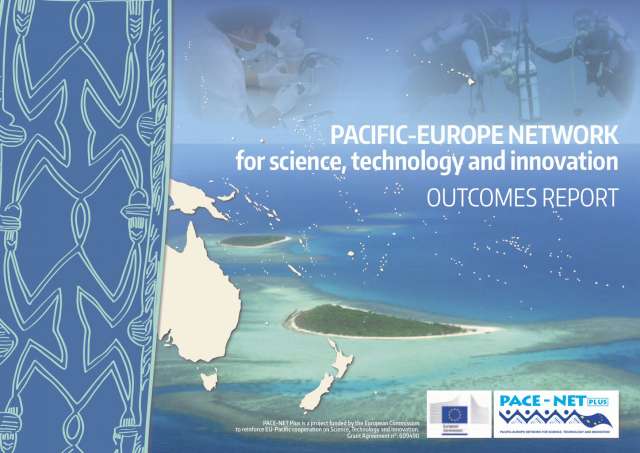The opportunities for European and Pacific researchers to collaborate are many and diverse. The European Union (EU) policies and scientific strategies aim at reinforcing these collaboration opportunities, notably through Horizon 2020, the European framework programme dedicated to research and innovation. Strengthening the Europe-Pacific bi-regional dialogue in science, technology and innovation (ST&I) is a key step in achieving increased collaboration towards the societal challenges identi ed in Horizon 2020.
This compendium presents the outcomes of PACE-NET Plus, a project funded by the European Commission (EC) under the 7th Framework Programme, which united 16 partners in the Pacific and the EU, coordinated by the French Research Institute for Sustainable Development (IRD), to strengthen ST&I cooperation between the Pacific island countries and Europe. This partnership involved a comprehensive collection of Pacific and European ST&I actors, including institutions from the two largest Pacific players, Australia and New Zealand, the French overseas countries and territories (New Caledonia and French Polynesia), European countries, Pacific island countries (Samoa, Vanuatu, Papua New Guinea), international multilateral institutions and Pacific regional bodies.
This project promoted the integration of the Pacific region and its interests into a number of EC roadmaps and actions. One of the core missions of PACE- NET Plus was to raise the visibility of the Pacific within the EU. In particular, this included the EC Directorates-General for Research and Innovation and for International Cooperation and Development, through illuminating the role of ST&I for development aid and better governance. Also included was the European Exterior Action Service, through “science diplomacy”. Conversely, PACE-NET Plus also aimed at assisting greater integration of EU activities into the research and development policies of the Pacific countries. The project was also a signi cant contributor to a bi-regional dialogue between the two regions.
PACE-NET Plus analysis of the research priorities of mutual interests for Europe and the Pacific highlighted three major societal challenges:
- Health, demographic change and wellbeing
- Food security, sustainable agriculture and forestry, marine and maritime and inland water research, and the bioeconomy
- Climate action, environment, resource e ciency and raw materials.
ST&I approaches play an important role in assisting Pacific nations to address these challenges which, compounded by geographic and socio-economic issues unique to the region, are also key developmental priorities.
Actions taken by PACE-NET Plus in the perspective of these multiple expectations are presented in this document. Also presented are major policy recommendations of the project, in collaboration with in uential Pacific regional bodies, such as the need to institutionalize the dialogue for ST&I between the Europe and Pacific. We also suggest the launch of two concrete support actions: the rst one dedicated to a multidisciplinary call for research (based on the PACE-Net Plus seed funding scheme) in order to stimulate cooperation between the PICTs, and with the European and Pacific larger countries (this call is endorsed by the ACP Secretary); the second action is dedicated to climate science through an interdisciplinary “observatory system of climate change and its impacts in the Pacific” (a pilot project on this topic was presented to the European Parliament and we are hopeful that it will be initiated during 2017).
On behalf of IRD, the coordinator of this project, we would like to wholeheartedly thank our partners as well as the three members of our External Advisory Board (Dr Raghunath Ghodake, APAARI; Dr Geo roy Lamarche, NIWA; and Dr Christophe Yvetot, UNIDO) for their deep and fruitful involvement in PACE-Net Plus, which has allowed us all to carry out this project successfully, and to surpass our goals. We would also like to sincerely thank the European Commission, particularly Mr. Armand Beuf, our scientific offcer for his e cient and benevolent support for PACE-NET Plus.
On behalf of the 16 partners of the PACE-NET Plus Consortium, we would also like to thank all those who took part in this network and dialogue and supported us in one way or another. We very much hope that the growing research community that we have mobilized together during the 3 last years in the region and in Europe, will remain ready to continue this regional and bi-regional cooperation and dialogue, while contributing to the well-being of Pacific and EU citizens.




